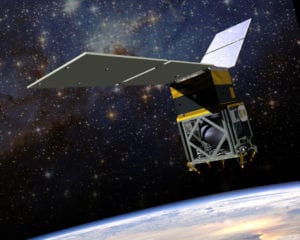
Ball Aerospace has officially commissioned NASA’s Green Propellant Infusion Mission (GPIM) and begun on-orbit testing of a non-toxic, high-performance propellant. GPIM launched on June 25, 2019 at 2:30 a.m. EDT on board a SpaceX Falcon Heavy rocket.
“We are excited for the opportunity to advance in-space propulsion for the entire user community, which has the potential to propel space industry mission planning into a new era,” said Dr. Makenzie Lystrup, vice president and general manager, Civil Space, Ball Aerospace. “This mission has been an excellent example of an industry-led team involving multiple NASA centers, the Air Force and industry partners to test this new high-performance fuel using a Ball small satellite.”
Ball designed and built the small satellite, which contains NASA’s first opportunity to demonstrate the practical capabilities of a “green” propellant and propulsion system in orbit – an alternative to conventional chemical propulsion systems. The propellant, called AF-M315E, is a Hydroxyl Ammonium Nitrate fuel and oxidizer monopropellant developed by the Air Force Research Laboratory.
GPIM is part of NASA’s Technology Demonstration Missions program within the Space Technology Mission Directorate (STMD), and Christopher McLean of Ball Aerospace serves as the principal investigator. Aerojet Rocketdyne designed and built the thrusters for GPIM that provide propulsion for the spacecraft.
“The successful commissioning of our thrusters and propulsion system is a positive step toward fully qualifying our green propulsion system in space,” said Joe Cassady, executive director of space at Aerojet Rocketdyne. “This technology will enable propulsive capabilities for a new generation of small satellites, including new mission capabilities.”
Over the next thirteen months, Ball Aerospace and its partners will test the thruster capabilities by verifying the propulsion subsystem, propellant performance, thruster performance and spacecraft attitude control performance. The primary mission of testing the thrusters and fuel will be complete within three months followed by testing of the secondary science payloads.
As the prime contractor for GPIM, Ball Aerospace is responsible for system engineering; flight thruster performance verification; ground and flight data review; spacecraft bus; assembly, integration and test; and launch and flight support. GPIM uses the Ball Configurable Platform (BCP) small satellite, which is about the size of a mini refrigerator and was built in just 46 days. The BCP small satellite provides standard payload interfaces and streamlined procedures, allowing rapid and affordable access to space with flight-proven performance. There are currently two BCP small satellites performing on orbit: STPSat-2, which launched in November 2010, and STPSat-3, which launched in November 2013. The two STP satellites were built for the U.S. Air Force Space Test Program’s Standard Interface Vehicle (STP-SIV) project.
 SpaceWatch.Global An independent perspective on space
SpaceWatch.Global An independent perspective on space




